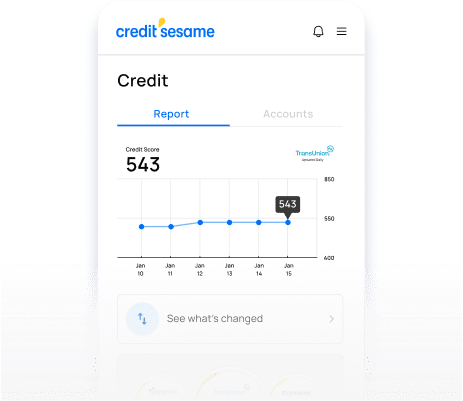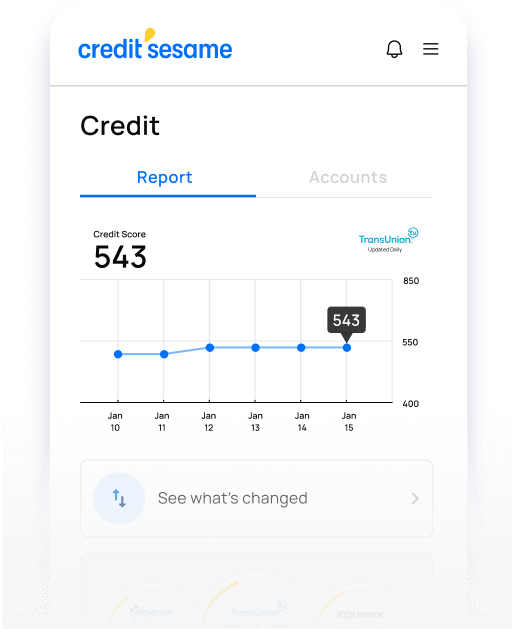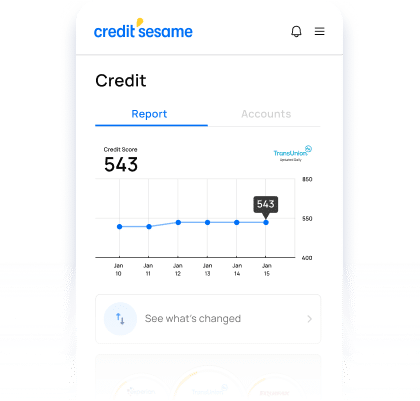What is a credit report?
A credit report is a document that summarizes your credit history, including information about your credit accounts, payment history and any public records. Credit reports are used by lenders to assess your creditworthiness, or your likelihood to repay a loan.

Get your FREE credit report summary
See the factors impacting your credit score and what you can do about it. 100% free.
By clicking on the button above, you agree to the Credit Sesame Terms of Use and Privacy Policy.
Share this
The purpose of a credit report
A credit report provides you with information on your past and present debt and can serve to inform prospective lenders about your financial habits.
A credit report is a document from one of the three credit reporting bureaus, TransUnion, Experian or Equifax. It contains a detailed history of your financial activity involving credit and debt. Credit reporting has been used for generations, but the modern credit report including a credit score emerged in the late 1980s.
For individual consumers, a credit report serves as an in-depth document with information tied to your use of debt. This could include rental or mortgage contracts you have held, credit card accounts, auto loans, student loans and more.
For banks, credit issuers, and other other organizations that may loan you money, a credit report provides insights to inform whether you are a good risk and will repay the debt. Under the federal Fair Credit Reporting Act, organizations allowed to access a credit report upon request include but are not limited to:
- Employers
- Government agencies
- Collectors and other organizations to whom you owe debt
- Rental property owners
Credit reporting bureaus can also send your report to others such as insurance companies. Legal professionals may request your file in cases involving court orders, subpoenas or child support.
Why does a credit report matter?
The purpose of a credit report is to provide an unbiased assessment of your financial history involving debt. Past generations relied on handwritten notes and handshake agreements. The modern financial system depends on the credit report as the definitive report documenting your behavior with credit.
A credit report can serve as a benchmark illustrating past financial habits, factors impacting your credit and opportunities for improving your credit history and, ultimately, credit score. For example, for those with good credit, a credit report provides validation with tangible dates, credit types and examples of timely payments. For those with modest to poor credit, a credit report provides details on cases in which payments have been missed or accounts that might be maxed out.
Who provides a credit report?
In the United States, there are three major credit bureaus that provide credit reports:
- Equifax
- Experian
- TransUnion
What information is in a credit report?
A credit report contains detailed information that is helpful and informative if you know how to use it. Each reporting bureau provides reports that look a bit different. Here’s an overview of the different sections of a credit report.
Account overview
This section lists all of the accounts, both open and closed, associated with credit taken out in your name including mortgages, home equity lines of credit or student loans. The report breaks this information into line-item detail so you can see individual summaries of the debt you hold and the overall portfolio of debt in your name. This is often summarized in a table, pie chart or both with details such as:
- Number of loans in each debt category
- Balance owed
- Credit available (where applicable)
- Credit limit
- Debt to credit ratio
- Amount of monthly payment
- Number of accounts with a balance owed
Account history
Each credit report contains details on how long you have had a credit history, typically listed in years and months. It might also contain some high-level insights, such as the average length of time for which you’ve held each type of debt listed. Some credit reports include the name of the very first company that extended your credit, as well as the name of the most recent company to extend credit.
Inquiries and requests to view your report
This section of your report tells you how many organizations have requested to look at your report over a set period of recent history. It also identifies the names of some or all of the organizations that have made such a request.
Some of these might be familiar to you (for example, if you have recently applied for a credit card at your local bank), while others might be unfamiliar.
Public records
Traffic tickets, civil claims and other payments made (or owed) to a government agency can appear on your credit report. This section details payments you have paid out in full as well as any debt you owe to an agency.
Credit Accounts In Good Standing
Your credit report provides a detailed history of your engagement with debt. This includes active accounts which you are still paying and closed accounts successfully paid down. You see a chart or table for each account in your name, along with accompanying information such as:
- Company name providing credit to you
- Company address
- Date you took out credit
- Type of credit extended
- Total credit extended (or credit limit value)
- Monthly payment
- Responsible party (or parties) for paying down the debt
- Date on which this debt started to be included on your credit report
- Most recent date on which status of this debt got updated on the report
Credit accounts with potentially negative items
Credit reports are intended to be an independent and verified source of information about your financial history and can contain potentially negative information. This can inform you of the things that might keep you from getting a higher credit score or otherwise limit your ability to secure a loan. The document also helps banks and others seeking to extend credit understand whether they can expect to be paid back.
If someone has committed identity theft or another form of fraud using your identity, this can jeopardize your private personal information and damage your credit report and credit score. It’s important to read this section with an open mind to understand where you might make improvements in your financial habits and also identify potential errors that need to be corrected. Details included in this section include:
- Creditors that have told the credit reporting bureau you owe them money
- Notes on the specifics of your case (for example, details on whether your bill has been sent to collections)
- Balance owed
- Information on whether you have disputed a claim (for example, in cases of fraud)
Personal details
Your credit report contains personal details that help to establish the accuracy of the records it contains. Common data points listed in your report include:
- Name (or names, if you go by a nickname or a maiden name on some of your accounts)
- Social security number
- Year of birth
- Spouse or co-applicant on some or all credit
- Employers
- Telephone number
- Home address
- Any other addresses on file from your past (e.g. apartments, single-family homes, etc.)
Miscellaneous
Other details sometimes accompany your credit report. You might find more information about disputing something on your report if you suspect identity theft has occurred. Additionally, you might find a summary of your legal rights under the Fair Credit Reporting Act and even in the state where you live. These details might not deal with your specific financial situation but they are good to keep on file in case you have questions or concerns in the future.
The benefits of understanding your credit report
It’s important to read your credit report like a contract or another important financial document. It may be tempting to scan or skip over parts, but a full understanding of the information on your report can help you understand what you may or may not be a good candidate for a loan or credit card. The benefits of reading your credit report thoroughly include:
- A better understanding of your overall financial health
- Greater visibility into how lenders may view you as a credit risk
- Faster access to red flags in the event your identity is compromised
How often should you review your credit report?
At least an annual check-in is advisable. Many people choose to check their credit report and credit score monthly or even more frequently.


How can I improve my credit report?
There are a number of things you can do to improve your credit report.
- Pay your bills on time. This is the most important thing you can do to improve your credit report. Late payments can have a significant negative impact on your credit score.
- Keep your credit utilization low. Your credit utilization is the percentage of your available credit that you are using. A high credit utilization can lower your credit score. Aim to keep your credit utilization below 30%.
- Get a credit builder account. A credit builder account is typically a type of secured account that helps individuals with little or no credit to build their credit history by reporting their on-time monthly payments to the credit bureaus. It can help you improve your credit score and learn about credit.
- Dispute any errors on your credit report. If you find any errors on your credit report, you should dispute them immediately. You can dispute errors online, by mail, or by phone.
Be patient. It takes time to improve your credit report. Don’t get discouraged if you don’t see results immediately. Just keep making good financial decisions and your credit report will improve over time.
In a nutshell
A credit report is a vital document that lenders use to assess your creditworthiness. It contains information about your credit history, such as your payment history, credit utilization, and debt load. It is important to understand your credit report and to dispute any errors that you find. You can also take steps to improve your credit score by paying your bills on time, keeping your credit utilization low, and managing your debt.
Your credit report is a powerful tool that can help you achieve your financial goals. By understanding your credit report and taking steps to improve your credit score, you can make it easier to get approved for loans, credit cards, and other forms of credit.

Get your FREE credit report summary
See your credit score and get insight into what’s impacting your credit
By clicking on the button above, you agree to the Credit Sesame Terms of Use and Privacy Policy.
Share this
More related articles

Get your FREE credit report summary
Understand your credit better with a free credit report summary
Value of credit reports
How to get a credit report
Reporting to credit bureaus
See your score and
credit report
summary.
See your score and credit report summary.
See the factors impacting your credit score
By clicking on the button above, you agree to the Credit Sesame Terms of Use and Privacy Policy.















